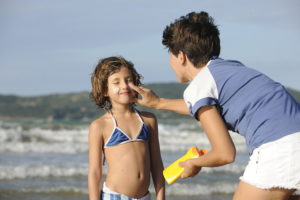How to Treat a Sunburn

You’re likely well aware of the importance of applying sunscreen. However, despite your best efforts to protect your skin, you might still get sunburned. You could miss a spot when applying your sunscreen, forget to reapply it after becoming preoccupied, or simply get caught off-guard on an unexpectedly sunny day. A sunburn is not always immediately apparent; in fact, your skin might not become noticeably red and inflamed for a few hours. But, don’t wait that long – if you suspect that you’re sunburned, follow these tips:
Cool Down
If there’s a pool, lake, or ocean nearby, take a quick dip to cool down, but don’t risk further skin damage by prolonging your sun exposure for any more than a few seconds. Then, cover up immediately and get out of the sun. If possible, seek shelter in an air-conditioned building. You can wrap an ice pack in a soft towel and gently apply it to the sunburned areas of your skin, or take a cool shower or bath – just don’t soak for too long, which can dehydrate your skin, or use harsh soaps, which can irritate your burned skin.
Moisturize Your Skin
After your shower or bath, gently apply a mild moisturizing lotion or aloe vera gel to your still-damp skin, then cover up with soft, loose, breathable clothing. Avoid using products that contain petroleum or oil-based ointments, which can actually trap heat and intensify the burn. Reapply your moisturizer as needed to keep your burned or peeling skin moist over the next few days.
Reduce Inflammation
To help relieve sunburn discomfort and inflammation, you can take a nonsteroidal anti-inflammatory drug (NSAID) as directed until you feel better. Some potentially effective options include ibuprofen, naproxen, and aspirin, which are readily available without a prescription. You can also apply an over-the-counter cortisone cream to help alleviate skin redness and swelling.
Prevent Dehydration
In response to a sunburn, your body will naturally draw fluid away from your core and redirect it to your skin’s surface, so you may become dehydrated. Therefore, while your skin is healing, you should drink extra water and other liquids, such as sports drinks, which can help replenish lost electrolytes.
When to See a Physician
You should seek professional medical attention if your sunburn is accompanied by fever, chills, or confusion; if you have severe blistering over a large portion of your body; or if signs of infection are present. If you experience any of these symptoms, come to South Tampa Immediate Care in Tampa, FL, where you can see a physician without an appointment (you can check in online ahead of time, if you’d like).












